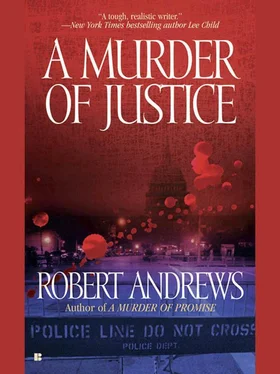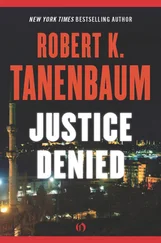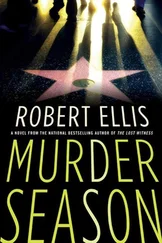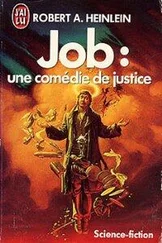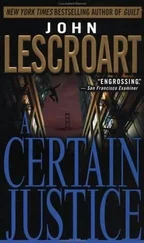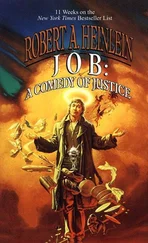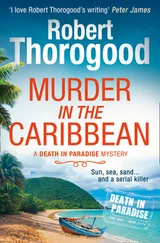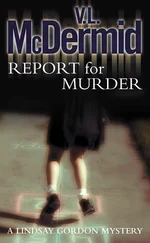Robert Andrews - A Murder of Justice
Здесь есть возможность читать онлайн «Robert Andrews - A Murder of Justice» весь текст электронной книги совершенно бесплатно (целиком полную версию без сокращений). В некоторых случаях можно слушать аудио, скачать через торрент в формате fb2 и присутствует краткое содержание. Жанр: Полицейский детектив, на английском языке. Описание произведения, (предисловие) а так же отзывы посетителей доступны на портале библиотеки ЛибКат.
- Название:A Murder of Justice
- Автор:
- Жанр:
- Год:неизвестен
- ISBN:нет данных
- Рейтинг книги:3 / 5. Голосов: 1
-
Избранное:Добавить в избранное
- Отзывы:
-
Ваша оценка:
- 60
- 1
- 2
- 3
- 4
- 5
A Murder of Justice: краткое содержание, описание и аннотация
Предлагаем к чтению аннотацию, описание, краткое содержание или предисловие (зависит от того, что написал сам автор книги «A Murder of Justice»). Если вы не нашли необходимую информацию о книге — напишите в комментариях, мы постараемся отыскать её.
A Murder of Justice — читать онлайн бесплатно полную книгу (весь текст) целиком
Ниже представлен текст книги, разбитый по страницам. Система сохранения места последней прочитанной страницы, позволяет с удобством читать онлайн бесплатно книгу «A Murder of Justice», без необходимости каждый раз заново искать на чём Вы остановились. Поставьте закладку, и сможете в любой момент перейти на страницу, на которой закончили чтение.
Интервал:
Закладка:
“How’d we get so lucky?” Atkins asked.
He sat silently, attentive, sipping coffee as Frank and Jose summarized Calkins’s findings. When they were finished he smiled a thank you.
“I wanted to hear this from you. I’ve got a personal interest in the Gentry case. Kevin Gentry was a great help to us when I was at WFO.” Atkins pronounced it “wif-oh”-Washington Field Office, the separate and subordinate FBI unit that did the Bureau’s work in the District of Columbia.
“Juan Brooks.” Jose filled in the silence.
Atkins got a tight, modest smile, the way a classy quarterback might smile when reminded of a winning touchdown pass in the last minutes of the Super Bowl.
“We busted Juan Brooks,” he said. “It was a team effort. While Malcolm Burridge was mayor, he did everything he could to keep the Bureau off Brooks’s back.”
“There were family connections,” Jose said. “Burridge’s daddy and Brooks’s daddy.”
Atkins’s brow furrowed. “I didn’t know that,” he said with a nod of appreciation. “Burridge was a problem. But then, Congressman Rhinelander and Kevin Gentry, who was his staff director at the time, came on the scene. Rhinelander had just taken over as subcommittee chairman and was looking for an issue.”
“Crime in the District,” Frank said.
Atkins smiled. “A rich social laboratory for any brave or foolish reformer, the District is. Anyway, Rhinelander and Gentry put the squeeze on Burridge. Burridge folded, and we finally bagged Brooks.”
Frank and Jose exchanged glances.
“Were you working with Mr. Gentry when he was killed?” Jose asked.
“No,” Atkins said regretfully. “By that time, they’d moved me up here”-he waved a hand to take in the office-“where I spend most of my time flying that desk. I’ve stayed in contact with Rhinelander. We talk occasionally. Kevin’s death hit him hard. I’d hoped that Frederick could put this behind him when the case was closed. Now…” Atkins let it trail off.
“And now Skeeter Hodges,” Frank said.
“Ah, yes,” Atkins said. “Same weapon, two years apart. Maybe the same shooter. Maybe not.” He looked at Jose and Frank. “You guys worked out a road map?”
Frank shook his head. “No maps yet. More like a compass direction.”
Atkins nodded. Something on his desk gave a chirping sound. He listened, and when the sound came again, he stood, signaling an end to the session. He offered his hand to Jose, then to Frank. “Keep me in the loop,” he told them, “anything we can do…” He smiled wistfully. “We all have our jobs to do in this, but I envy you two. Happiest years of my life were working the street.”
Never fails, does it?” Jose asked as he started the car.
“What?”
“Oh, guys who’ve worked their butts off to get off the street and get into a big office telling you how much they miss the street.”
That evening, Frank had a message on his answering machine from John McDonnell at Olsson’s. The message, like McDonnell, was spare and abrupt. A book had come in, McDonnell was holding it for him.
John McDonnell, round-faced and in his seventies, leaned forward in the scarred wooden chair. His deep blue eyes and rimless bifocals gave him a priestly, bemused look-a beneficence conferred by a lifetime spent with books. Peering into the tiny green screen of an ancient Kaypro computer, he pecked at the keyboard.
Frank saw the screen flicker, but McDonnell’s somber expression didn’t change. Books surrounded him: books stacked on either side of the Kaypro, books on floor-to-ceiling shelves around him, three books in his lap.
Olsson’s Books amp; Records, like McDonnell, was a cherished Georgetown landmark. A place where little old ladies could bring their dogs in. Only two windows wide, it had fronted Wisconsin Avenue for at least twenty years. Inside, the store extended back beyond sight. Immediately through the narrow door, an island of literary trade paperbacks. To the right of the island, a Ritz camera booth; to the left, three registers framed by racks of mass-market paperbacks. Farther on, the music section, with CDs, cassettes, and a curling black-and-white poster of Johnny Cash. The serious books were at the rear, where McDonnell and his Kaypro constantly inventoried the shop’s backlist.
Foreclosure was in the air. Taxes go up. Leases run out. The chains open on every corner. An end of what had been. And what would be no more.
“Evening, John.”
McDonnell didn’t look up right away. He glanced at the computer screen, then opened a book in his lap and began easing an art gum eraser over the price penciled inside. That done, he closed the cover and looked up at Frank. The book, Frank saw, was Larteguy’s The Centurions.
“First British edition, the Xan Fielding translation,” McDonnell said, fingertips caressing the dust jacket. He lifted the book, and the way he did it made Frank think of a priest offering the cup in communion. McDonnell held out the book, looking at it sadly.
“Here.”
“How much?”
McDonnell shook his head. “Here. Take it.”
“I can’t. How much?”
McDonnell looked at Frank, then at the book, then back to Frank.
“You already have The Praetorians.” McDonnell thrust the book closer to Frank. “Please.”
Frank took it. Tight binding. Only the slightest shelf wear at the jacket edges.
“I can’t.”
McDonnell had dropped his hand back into his lap. “Make a donation to the Salvation Army.”
Frank thought about putting the book down on the stack by the Kaypro, then thought better of it.
“Thanks,” he said. He felt uncomfortable. As if he’d witnessed a personal tragedy and knew he ought to say something comforting but couldn’t find the words.
McDonnell broke the silence. “Haven’t seen your dad.”
“Moved back to the country.”
McDonnell nodded approvingly.
On impulse, Frank asked, “What’s the deal on Frederick Rhinelander?”
A woman came by, paused to browse over the books by the computer, and moved on. McDonnell watched her walk away, then looked up at Frank.
“Three-term congressman. Republican. New Hampshire.” McDonnell recited the basics.
Like somebody had flipped a memory switch.
“Personals?”
“Personal?… A piss-ant.” McDonnell said it dispassionately, without a trace of rancor. “All the nightmare insecurities of a little man who’s got a lot of money he didn’t earn.”
“Piss-ant? A member of Congress?”
McDonnell smiled, shrugged, and went back to his inventory.
Frank held up The Centurions. “Thanks.”
“You’re still missing Yellow Fever,” McDonnell said, eyes on the computer screen.
“You look for it?”
“Yes. But time’s running out.”
“And I pay.”
“Sure.”
“Closing a bookstore must be a lot like going to the gallows,” Frank said. It had popped into his head and out of his mouth.
McDonnell, eyes still on the computer screen, gave no sign he’d heard.
Frank hesitated, and turned to leave. Then he heard McDonnell behind him.
“Life’s pleasant, Frank. Death’s peaceful. It’s the transition that’s troublesome.”
Frank turned back.
McDonnell looked up from the computer and smiled a benediction.
ELEVEN
Milton, a white guy with a graying brush-cut, wore jeans and a khaki shirt. Yellow-lens shooting glasses and a pair of sound-suppressing earmuffs around his neck accented his high cheekbones and gave him the lean look of a hunter, which he had been once.
He sat on the bench between Frank and Jose, the Gentry case folder open in his lap. On the firing line, ten or so feet away, a single plainclothes-a female officer-practiced slow fire at a silhouette target. The peppery nitro odor of gunpowder hung in the air.
Читать дальшеИнтервал:
Закладка:
Похожие книги на «A Murder of Justice»
Представляем Вашему вниманию похожие книги на «A Murder of Justice» списком для выбора. Мы отобрали схожую по названию и смыслу литературу в надежде предоставить читателям больше вариантов отыскать новые, интересные, ещё непрочитанные произведения.
Обсуждение, отзывы о книге «A Murder of Justice» и просто собственные мнения читателей. Оставьте ваши комментарии, напишите, что Вы думаете о произведении, его смысле или главных героях. Укажите что конкретно понравилось, а что нет, и почему Вы так считаете.
